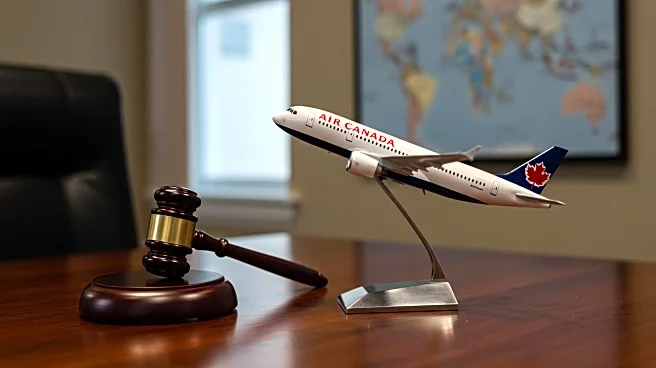What is the story about?
What's Happening?
The Canadian government has intervened in a strike by Air Canada's flight attendants, ordering them back to work and into arbitration. This decision comes after more than 10,000 flight attendants, represented by the Canadian Union of Public Employees (CUPE), initiated a strike, disrupting travel for over 100,000 passengers globally. The strike began after the union rejected Air Canada's proposal to enter government-directed arbitration, which would have removed their right to strike. Federal Jobs Minister Patty Hajdu emphasized the need to avoid economic risks, especially in light of U.S. tariffs on Canada. The intervention mandates the continuation of the existing collective agreement until a new one is established through arbitration. The strike has significantly impacted Air Canada's operations, which include approximately 700 flights daily, affecting around 130,000 passengers each day.
Why It's Important?
The government's intervention in the Air Canada strike highlights the critical role of air travel in Canada's economy and daily life. With the country being the second-largest in the world, air travel is often the only viable option for long-distance travel. The disruption caused by the strike underscores the dependency on air services and the potential economic impact of prolonged service interruptions. The decision to enforce arbitration reflects the government's stance on maintaining essential services and mitigating economic disruptions. This move could set a precedent for future labor disputes in essential industries, balancing workers' rights with economic stability. The outcome of the arbitration could influence labor negotiations across the airline industry, potentially affecting wage standards and working conditions.
What's Next?
The arbitration process will determine the terms of the new contract between Air Canada and its flight attendants. The Canada Industrial Relations Board will oversee the extension of the current agreement until arbitration concludes. Air Canada has indicated that it may take up to a week to fully resume operations, affecting nearly a million passengers. The union has expressed dissatisfaction with the government's swift intervention, citing a violation of their right to strike. The outcome of the arbitration could lead to changes in compensation and working conditions for flight attendants, potentially impacting future labor negotiations in the airline industry. Stakeholders, including the Business Council of Canada and the Canadian Chamber of Commerce, have supported the government's decision, emphasizing the need for a swift resolution to minimize economic impact.
Beyond the Headlines
The intervention raises questions about the balance between labor rights and economic stability. The government's decision to enforce arbitration may be seen as undermining the union's bargaining power, potentially setting a precedent for future labor disputes. The strike also highlights gender disparities in the airline industry, with flight attendants, predominantly women, advocating for fair compensation compared to their male counterparts, such as pilots. The resolution of this dispute could influence broader discussions on gender equity and fair labor practices in the workplace.

















